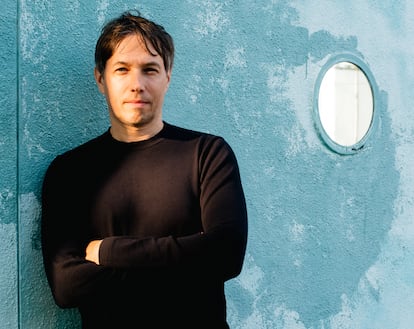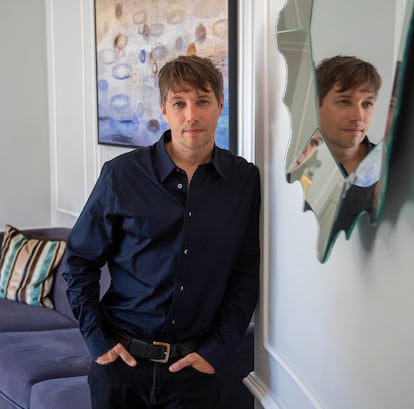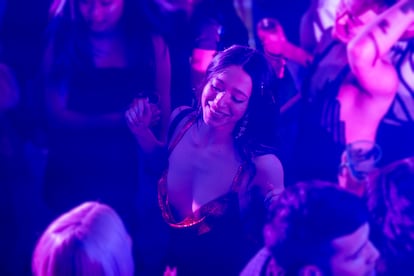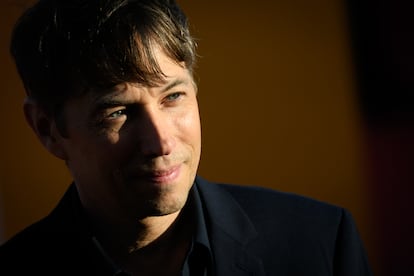Sean Baker, the director of the dark side of the American dream: ‘I think I show an America that you would otherwise never see on the big screen’
With ‘Anora,’ winner of the Palme d’Or at Cannes, the director premieres his fifth feature film involving sex workers. ‘If being indie means that you have complete control over your work, I will always be indie’

Sean Baker is scared of the figure of Eloy de la Iglesia. That a cursed director of the Spanish Transition — the man who portrayed the wave of destruction that heroin caused in the sewers of the vaunted Movida Madrileña — scares the most recent winner of the Cannes Palme d’Or, an indie filmmaker with a New York soul, is a sign of the shadows Baker hides. “At New York University, we didn’t get that Spanish cinema. I discovered it about five years ago and I feel more aligned with it than with Fellini,” he says. “His personality reminds me of Pasolini, and I’ve been told that his drug addiction originated from his interaction with actors. That scares me because I was hooked. I had problems with drugs, I was addicted to heroin at the end of the 1990s, when I was in my twenties. Sometimes I get scared when I realize that I’m getting too close to those worlds again. In one film I had a person shooting up next to me. Ugh.” For a filmmaker who doesn’t enjoy interviews, the confession came out in torrents.
The recently released Anora is the fifth film in which the 53-year-old New Yorker studies characters related to prostitution or the sex business, and Baker’s films certainly have very little in common with Julia Roberts’ prostitute in Pretty Woman. “I think that the public can identify with characters that they couldn’t stand in real life. And in my case, I like to portray characters who pursue the American dream and put the spotlight on situations that Hollywood is unable to portray well,” he says.

The interview took place in September during the San Sebastián Film Festival, where the filmmaker was accompanying the screening of Anora in the Perlak section. Two meters away from the director and this journalist sat Samantha Quan, casting director turned producer since The Florida Project (2017) — arguably Baker’s best film — and also his wife. With each answer, he looked at her. At the end of the interview she joined the conversation, and during the photo shoot it was Quan who commanded the rest of those involved. “I depend on her completely, she makes as many decisions as I do,” Baker said. And she helped him in all the creative processes. In Cannes, the filmmaker provoked great laughter when he told the press conference that he had simulated the erotic dances in front of the actors “with Sam, the producer.” After a few seconds of awkward silence, he added: “Please, please, let me clarify that Sam is also my wife.” Although the actors were offered an intimacy coordinator, the cast decided to film under the instructions of the couple.
The triumph of Anora at Cannes — where no American film had won since Terrence Malik’s The Tree of Life in 2011 — gives Baker a certain peace of mind for the future: “Before the Palme d’Or, there was the honorary award given to George Lucas by Francis Ford Coppola. I had my two heroes in front of me and I couldn’t pay attention because I was so nervous. What happened next is completely erased from my memory. Over the months I have come to understand that the Palme d’Or elevates me to a place from which I can probably make the films I want. I haven’t been asked about the next Marvel film, although it is also true that I believe that people should understand that films for adults can be made without superheroes and explosions.”

In fact, Baker had already suffered from blackouts like the one at Cannes. At the end of January 2018, the filmmaker landed in Madrid on the European promotional tour for The Florida Project. As soon as he got off the plane, he was told that the nominations for the Oscars had been announced, where his film, shot in the vicinity of Disney World, had only earned one nomination: best supporting actor for Willem Dafoe, contrary to expectations. Experts had given the film possibilities in several other categories. Of those days in the Spanish capital he remembers “absolutely nothing.” “I was tired, I was, let’s not fool ourselves, very disappointed... It’s as if that trip had never happened,” he says with a laugh, as if he were releasing stress.
The son of a patent attorney and a teacher, Baker began making home movies as a child after watching a Universal monster classics series at the Summit municipal library with his mother. He studied film at New York University and achieved some success with the series Greg the Bunny, short films made with friends that narrated the antics of a puppet, “one of the 3.2 million Americans born out of a factory,” according to a promotional phrase. Baker was involved in drugs and the series was developed for television without him. When he overcame his addictions, he studied editing at The New School (he edits all his films). His first feature film, Four Letter Words (2000), delved into the language and concerns of American youth. Four years later, he co-directed Take Out, in which a Chinese immigrant is forced to pay off his debts in one day. Thus began his journey through the shadows of the American dream, a journey he is still on. In Prince of Broadway (2008), the protagonist was an immigrant from Ghana, a street vendor in Manhattan who discovers that he is a father. As he had a legal dispute over the title with Take Out, both were released commercially in 2008 and both were nominated for the Independent Spirit Awards, the indie film awards. And with Starlet (2012), the strange friendship between a 21-year-old girl and an 85-year-old woman in the Californian San Fernando Valley, his reputation was strengthened in the indie world.
His fifth feature, Tangerine (2015), maintains his commitment to exploring social margins. Its protagonist is a trans prostitute who, on Christmas Eve, walks through the bitterest streets of Hollywood looking for her boyfriend and pimp, who she has found out is cheating on her. “We used three cell phones. We threw one away because the lens didn’t give the same quality as the other two. The second, yes, is in the museum, which is wonderful, but I kept the other one,” Baker recalls. Which doesn’t make him an apostle of digital. “Not at all, and I went back to analogue because I think the textures are different: if you compare the same shot made with a celluloid camera and digital, the difference is overwhelming in favor of what was shot with film,” he points out. The last sequence of The Florida Project (2017) was also shot with an iPhone. “We made a virtue out of necessity, and only later, in the editing process, did I understand the homage to Tangerine,” he says about the end of his crude portrait of the poverty surrounding Disney World in Florida, of children living in colorful motels, drains from which outcasts emerge, and people who make a living selling counterfeit perfumes, but where human kindness flourishes. With Red Rocket (2021), he had already competed at Cannes, where he presented his hilarious parable about the return of a porn actor to his hometown in Texas, with no money or plans for the future.
When it came time to look for Ani, I saw Scream and Mikey was there. I think there are great performances in horror movies that are undervalued by critics and awards. We dismiss some genres too quickly”
With Anora, Baker once again offers a different look at prostitution. It’s a twist on the concept of Pretty Woman, a cocktail of Howard Hawks, Billy Wilder and Hal Ashby, through a stripper who also works as a prostitute in the Brighton Beach neighborhood, and who ends up having an affair with the immature and somewhat naïve son of a Russian oligarch. As if Fellini’s Nights of Cabiria — ”a guide film for Anora” — were transferred to a hedonistic and unbridled New York. It would be Pretty Woman covered in cocaine, luxury mansions paid for by future in-laws you wouldn’t want to meet, and melancholic thugs. “I didn’t realize the echo of this comedy until a week before filming, when someone on the crew pointed out the similarities to me. The truth is that I haven’t seen it since it came out in 1990. Now, a lot of people still like it, so if I can get more audiences this way...”
In Anora, the underdog characters, thrown to the margins by society, return. “I think they are funny, that through them you can draw a whole society. I also think it’s worth reminding the audience that they are there, that they are our neighbors. Mickey [the protagonist of Red Rocket] is someone who doesn’t want the shitty life he leads, but who probably deserves that existential ruin. Ani [the protagonist of Anora], on the other hand, is going through another situation; the audience empathizes more with her, they will understand what Ani wants. At one point in the film, she opens up, she... unfolds.”

Mikey Madison came to give Ani a face from Baker’s subconscious. “She came onto my radar when I saw Once Upon a Time... in Hollywood and she was filed away in the back of my brain. When it came time to look for Ani, I saw Scream and Mikey was there. I think there are great performances in horror movies that are undervalued by critics and awards. We dismiss some genres too quickly… I am an indie creator: I get involved in the social groups I am going to portray, I usually move to the places where I am going to shoot, I immerse myself in those worlds. But I understand and defend that we have to entertain the public, tell them a story. Some of us use drama or social comedy, others horror,” he reflects. “And Mikey is a great actress wherever she acts. She decided on the final gesture, and when we filmed it I jumped: it’s the same one Giulietta Masina made in Nights of Cabiria. And it came about by chance.”
Anora splits in two, and in between a musical hinge makes a madcap comedy transition into a revved-up thriller. “I choose the songs very carefully, I think they’re important in the narratives. And it pains me when I don’t get the rights to a song. For Anora we wanted Gucci Flip Flops [by Bhad Bhabie], because it fit the spirit, and they asked us for a lot of money [Quan says it was $70,000] for the rights. Impossible. Now, in exchange we got the Take That hit, Greatest Day, which seems composed as a clichéd anthem for a romantic comedy. It’s a great pop song. You can hum the melody after hearing it once. She’s talking about her best day, we put it in in such an obvious way that it ends up being ironic and shameless; it sticks to the action.”

For Baker, there is no other cinematic route beyond indie. “Of my generation, with the Palme d’Or I’ve become the best known, although I’m not the only one. And behind me there are a lot of very interesting directors and collectives. I’m a kid who grew up watching Spielberg and Lucas movies, who eventually learned that there were other cinemas and other worlds,” he explains. “If being indie means you have complete control over your work, I’ll always be indie. If leaving this universe means that I can’t have the ultimate decision at any point in the production of a film, I will never leave it.” Quan goes on to explain that it’s an old conversation they already broached years ago. “And that’s why I’m his producer: my job is to make sure Sean has everything he wants in pursuit of a great film. We talk about everything, although the final decision belongs to him.”

Can we get to know America through Baker’s films? “What filmmaker doesn’t like to be told that?” he answers with a smile. “I accept it. I think I show an America that you would otherwise never see on the big screen. I’m not going to give a voice to the voiceless. I’m not that naïve. However, there are many nations in my nation. That’s why I’m so concerned about what’s going to happen in the November 5 elections.” And that’s why, because Baker is attentive to other social classes, Anora came about. “I wrote it 15 years ago and it stayed in a drawer. And when we were considering possible themes for a new film, I thought about that world of Brighton Beach, the Russian community that you hear about in the news, and I took out that script and adapted it.” Which gives another clue: in that drawer, Baker keeps enough scripts to keep him active. “I have, for example, another film written about drug user activism that takes place in Vancouver, and that connects with my past. I’m not sure if it’s my next project, but it’s there.”
Sign up for our weekly newsletter to get more English-language news coverage from EL PAÍS USA Edition
Tu suscripción se está usando en otro dispositivo
¿Quieres añadir otro usuario a tu suscripción?
Si continúas leyendo en este dispositivo, no se podrá leer en el otro.
FlechaTu suscripción se está usando en otro dispositivo y solo puedes acceder a EL PAÍS desde un dispositivo a la vez.
Si quieres compartir tu cuenta, cambia tu suscripción a la modalidad Premium, así podrás añadir otro usuario. Cada uno accederá con su propia cuenta de email, lo que os permitirá personalizar vuestra experiencia en EL PAÍS.
¿Tienes una suscripción de empresa? Accede aquí para contratar más cuentas.
En el caso de no saber quién está usando tu cuenta, te recomendamos cambiar tu contraseña aquí.
Si decides continuar compartiendo tu cuenta, este mensaje se mostrará en tu dispositivo y en el de la otra persona que está usando tu cuenta de forma indefinida, afectando a tu experiencia de lectura. Puedes consultar aquí los términos y condiciones de la suscripción digital.









































